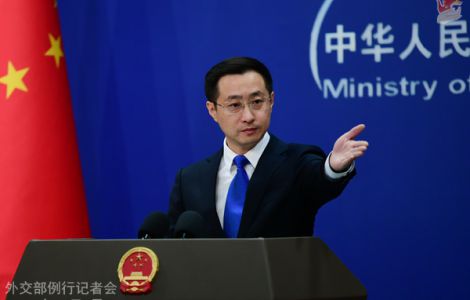中英对照:2024年12月5日外交部发言人林剑主持例行记者会 [2]
Foreign Ministry Spokesperson Lin Jian’s Regular Press Conference on December 5, 2024 [2]
中方欢迎罗德里格斯副总统访华,期待通过此访推进落实两国元首重要共识,赓续中委传统友谊,深化各领域务实合作,为中委全天候战略伙伴关系发展注入新动力,更好造福两国人民。有关访问情况,我们会适时发布消息。
China welcomes the visit by Vice President Rodríguez and hopes that the visit will further galvanize effort to deliver on the important common understandings between the two presidents, carry on the traditional friendship, deepen practical cooperation in various areas, and provide new impetus for the development of the China-Venezuela all-weather strategic partnership for the benefit of the two peoples. On the details of the visit, we will release information in due course.
共同社记者据日媒报道,日本外相将于本月底对中国进行正式访问,双方工作层正就两国外长会面进行磋商。请问发言人对此有何期待?
Kyodo News Japanese media reported that Japanese foreign minister will pay an official visit to China at the end of this month. Are the two sides having talks over the meeting between Chinese and Japanese foreign ministers and what’s your expectation for the visit?
林剑 中方重视同日方保持各领域、各层级对话沟通,愿同日方共同致力于推动中日关系改善发展。关于你提到的具体访问,目前我没有可以提供的信息。
Lin Jian China attaches importance to dialogue and communication with Japan in various fields and at various levels. We stand ready to work with Japan to jointly improve and grow bilateral relations. On the visit you mentioned, I have nothing to share at the moment.
法新社记者昨天,台湾领导人赖清德与美国国会众议长约翰逊通话。中方对此有何评论?
AFP Taiwan’s leader Lai Ching-te spoke with US Speaker of the House Mike Johnson over the phone yesterday. Does China have a comment on this phone call?
林剑 近日,中方已多次就美方执意安排赖清德“过境”和美台官方往来表明严正立场。我要再次强调,台湾问题是中国核心利益中的核心,是中美关系第一条不可逾越的红线。我们敦促美方认清“台独”分裂行径对台海和平稳定的严重危害,切实恪守一个中国原则和中美三个联合公报,兑现美国领导人不支持“台独”等承诺,停止干涉中国内政,停止向“台独”分裂势力发出错误信号。中方将采取坚决有力措施,坚定捍卫国家主权和领土完整。
Lin Jian In recent weeks, we have made clear our serious opposition more than once to the US’s arranging for Lai Ching-te’s “stopovers” and having official interactions with the Taiwan region. Let me stress once again that the Taiwan question is at the core of China’s core interests, and the first red line that cannot be crossed in China-US relations. We urge the US to fully understand the grave damage that “Taiwan independence” separatist activities do to peace and stability in the Taiwan Strait, fully abide by the one-China principle and the three China-US joint communiqués, act on the US leaders’ commitments, including not supporting “Taiwan independence,” stop interfering in China’s internal affairs, and stop sending any wrong signal to “Taiwan independence” separatist forces. China will take resolute and strong measures to defend our nation’s sovereignty and territorial integrity.
《环球时报》记者3日,英国广播公司(BBC)发布所谓调查报道,称英国超市售卖的多种番茄酱可能含有来自中国新疆的番茄原料,这些番茄可能是“强迫劳动”的产物。BBC还发布了一段所谓揭秘新疆番茄涉及“强迫劳动”的视频,呼吁西方国家停止使用新疆番茄原料或成品。发言人对此有何评论?
Global Times On December 3, BBC’s so-called investigation claims that tomato purées sold by several UK supermarkets appear to contain tomatoes grown and picked in Xinjiang using forced labor. BBC also released a video clip to try to prove that so-called “forced labor” is used for Xinjiang tomatoes and call on Western countries to stop using Xinjiang tomato or its product. Can I have your comment on that?
林剑 我们多次强调,新疆不存在“强迫劳动”,中国政府也始终坚决反对并严厉打击强迫劳动。新疆番茄和新疆棉花一样,都是享誉世界、家喻户晓的优质产品,从种植到采收已基本实现机械化,机采率分别超过90%和85%,又何谈“强迫劳动”呢?
Lin Jian Again, as we have made very clear before, there’s no “forced labor” in Xinjiang. The Chinese government stands firmly against forced labor and has taken tough measures against it. Xinjiang tomatoes, like Xinjiang cotton, are known and enjoyed throughout the world for their high quality. The farming process of tomatoes and cotton in Xinjiang has largely been mechanized already—over 90% of the tomatoes and over 85% of the cotton in Xinjiang are now harvested by machines. How could there be “forced labor?”
新闻的生命在于真实,不造谣传谣、不偏听偏信是新闻职业道德的起码要求,也是公正客观媒体的基本素养。在这份调查报告和视频中,所谓“证据”很多都冠以“声称”“感受”等这样的主观臆断,在未经核实的情况下先入为主、断章取义,妄言新疆番茄采收行业存在“强迫劳动”。有关记者大费周章花几个月时间去研究十几种不同的番茄酱、却不愿花一秒钟去了解新疆的真相,这是典型的双标偏见。
Journalism lives in its truthfulness. To say no to disinformation and bias is a primary ethic of journalism. This is also a basic quality for any news outlet that wants to do fair and objective reporting. In the BBC story, a lot of the so-called “evidence” came from what the interviewees “heard” or “felt.” The reporting is based on preconceived assumptions and jumped to the “forced labor” conclusion without verifying the assumptions and by taking words out of context. The reporters went to the trouble of spending months studying nearly 20 tomato purées, but would not spend even one minute learning about the reality in Xinjiang. This is typical double standard with deep bias.
近些年,一些别有用心的人不断借“强迫劳动”来博眼球、蹭热点,一批批所谓“导演”“演员”粉墨登场,一篇篇所谓“证词”“报告”屡见不鲜。上周炒作新疆的棉花,这周又炒作新疆的番茄,下周是不是又要把黑手伸向新疆的光伏、新疆的胡萝卜,甚至是新疆的牛羊肉呢?可无论如何污蔑抹黑,都改变不了新疆产品物美质优的本质,破坏不了新疆经济社会稳定发展的事实。我们希望有关方面认清“强迫劳动”谎言背后的险恶用心,也欢迎大家多到新疆走一走看一看,实地品尝新疆的番茄,体验新疆的生活,感受真实的新疆。
In recent years, “forced labor” has become a convenient false narrative for some to create media hypes and attack Xinjiang. Their self-directed, well-scripted productions contain so-called “testimonies” and “reports” from dubious sources. Last week, the story was on Xinjiang cotton. This week, it’s on Xinjiang tomatoes. So what will it be next week? Xinjiang solar energy? Xinjiang carrots? Or Xinjiang mutton and beef? Whatever the disinformation, it will not change the high quality of Xinjiang products, nor will it make Xinjiang a less prosperous and stable place. We hope readers will see through this “forced labor” narrative. And we welcome people to go to Xinjiang, try the tomatoes and experience Xinjiang as it is.
法新社记者中方对韩国局势包括短暂实施紧急戒严有无进一步评论?中方认为韩国政局将如何影响朝鲜半岛稳定?
AFP Just a question on South Korea, I wonder if China has any further comments on the situation there, including the brief period of martial law and maybe more specifically how does China see the political situation in the South relating to the stability of the Korean Peninsula more broadly?
注:为确保中英对照准确,“热词译”网站可能对中英文重新分段。

